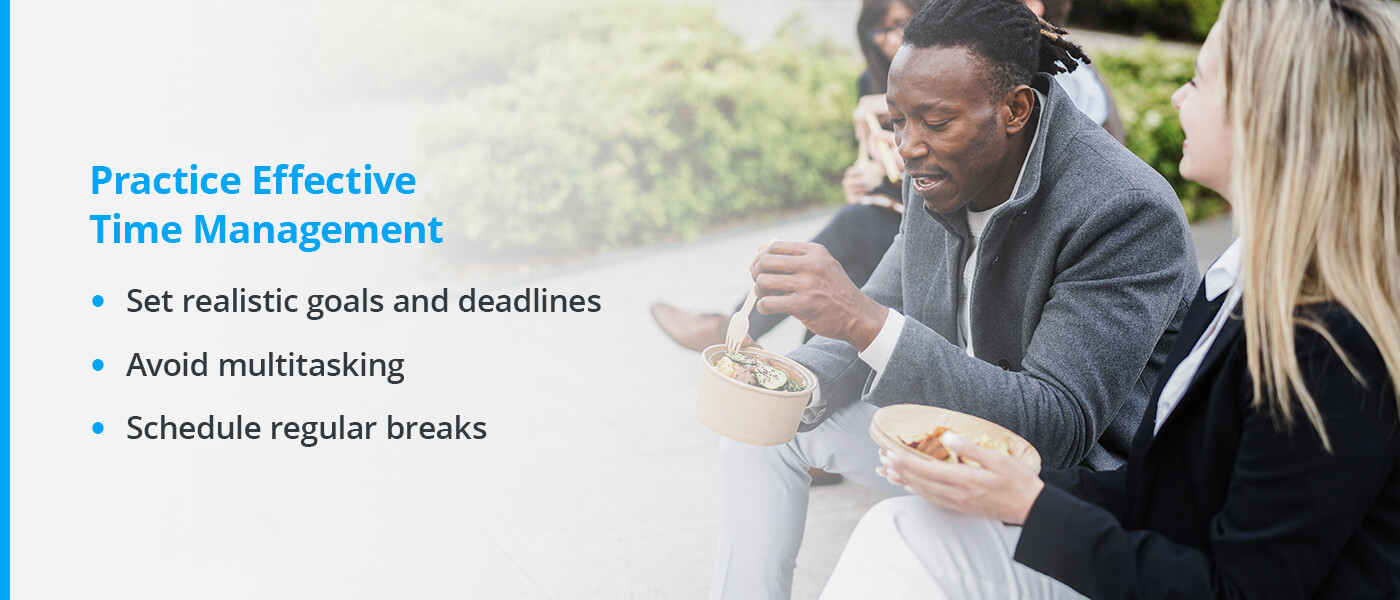Work-life balance statistics show that many people struggle to maintain the right equilibrium between their work and personal lives. Globally, over one-third of all workers regularly work more than 48 hours per week. This lack of work-home balance represents the delicate interplay between the commitments and responsibilities of one’s career and the desire for a satisfying and enriching personal life.
Learn more about the importance of a healthy work-life balance and explore the strategies and insights that can empower you to embrace this vital aspect of human existence.
What Really Is Work-Life Balance?
Balance refers to more than a simple division of time — it is a holistic approach to living that allows individuals to thrive in their professional endeavors, personal relationships and self-care.
An employee’s work-life balance allows them to navigate the rigors of their careers while nurturing meaningful relationships, pursuing hobbies and taking time for self-care. This balance is the key to life. It encompasses understanding an individual’s values, priorities and boundaries to preserve their physical, mental and emotional health.
When professionals align their aspirations and responsibilities with their overall well-being, they unlock the potential to excel in their careers while enjoying a sense of personal fulfillment.
Modern work cultures often encourage a relentless pursuit of productivity and success, which can lead to neglecting personal life. Unchecked, this can result in burnout, increased stress and strained relationships. Hence, it becomes imperative for professionals to intentionally create boundaries between work and personal life and advocate for integrating balance into their careers.
9 Tips to Work Towards Work-Life Balance
Research showed that achieving a better balance between professional and personal priorities is a combination of reflexivity and intentional role redefinition. Achieving work-life balance is an ongoing process that requires conscious effort and a commitment to nurturing both personal and professional aspects of life. Here are some invaluable tips to help professionals on their journey toward attaining equilibrium:
1. Define Your Priorities
Set clear boundaries between your work and personal life by determining specific working hours and consciously detaching from professional concerns when the workday ends. Communicate these boundaries with colleagues, supervisors and loved ones, fostering a supportive environment that respects your need for personal time.
Take a holistic approach when doing this and consider all aspects of your life — career, family, relationships, personal growth, health and hobbies. Reflect on what brings you joy, fulfillment and a sense of purpose.
2. Set Boundaries
Imagine boundaries as the invisible fence that encircles your life, protecting your time, energy and well-being from external intrusions. Setting boundaries will help you achieve work-life balance, allowing you to carve out dedicated spaces for both your professional pursuits and personal life. Just as a skilled conductor directs an orchestra, you orchestrate your life by establishing boundaries safeguarding your equilibrium.
Boundaries come in various forms, including time boundaries, physical boundaries and emotional boundaries.
3. Practice Effective Time Management
Time is an invaluable resource and how we manage it directly impacts our ability to achieve work-life balance. By mastering the art, you can optimize your productivity, reduce stress and create the space necessary for both your professional and personal pursuits to flourish. Some ways to enhance your time management include:
- Set realistic goals and deadlines: Avoid overcommitting yourself, as it can lead to feeling overwhelmed and compromising your work-life balance. Break larger tasks into smaller, manageable steps and assign realistic deadlines to ensure steady progress.
- Avoid multitasking: While multitasking may seem like a time-saver, it often leads to decreased productivity and increased stress. Instead, practice single-tasking, devoting your full attention to one task to achieve better results.
- Schedule regular breaks: Incorporate regular breaks into your workday to prevent burnout and maintain focus. Short breaks can refresh your mind, improve creativity and boost your overall well-being.
4. Learn to Say No
Learning to say no becomes a weapon in your arsenal for achieving work-life balance in a world that celebrates constant productivity and endless commitments. Saying no does not signify indifference or lack of enthusiasm — rather, it reflects your commitment to preserving your well-being and priorities. By politely declining requests or opportunities that don’t align with your goals, you protect yourself from becoming overburdened or stretched too thin.
5. Embrace Flexibility
Embracing flexibility allows you to respond to the ever-changing rhythm of life without losing your footing. Flexibility empowers you to let go of rigid expectations and embrace uncertainty with a sense of calm. By accepting that things may not always go as planned, you can reduce the stress and anxiety associated with the need for control.
Flexibility also teaches you to celebrate progress over perfection. Embrace the idea that balance is an ongoing journey and making adjustments along the way is okay. Instead of perfection, rather celebrate your efforts, achievements and growth.
6. Disconnect Regularly
In the age of constant connectivity, disconnecting regularly becomes a vital act of self-care, allowing you to reclaim moments of tranquility and deepen your connection with yourself. Disconnecting can:
- Enhance your focus and productivity: Frequent digital distractions can fragment your attention and hinder your focus. Well-balanced people are more productive. By disconnecting, you create uninterrupted periods to concentrate on tasks, fostering a deeper sense of focus and efficiency.
- Improve the quality of your sleep: Disconnecting before bedtime allows your brain to wind down naturally, promoting better sleep quality and leaving you refreshed in the morning.
7. Delegate and Collaborate
Delegating tasks and embracing teamwork are not signs of weakness — rather, they are expressions of your leadership and wisdom in utilizing the strengths of others to achieve shared goals. By sharing your responsibilities with others, you can alleviate the burden of an overwhelming workload while providing them with opportunities for growth and development.
Embracing collaboration can be invaluable in times of challenges or when seeking guidance in both professional and personal realms.
8. Plan Regular Breaks and Vacations
Schedule regular breaks throughout the year and remember to plan for vacations. Time away from work rejuvenates the mind and provides an opportunity to create lasting memories with loved ones. Taking breaks and vacations allows you to recharge your energy and vitality. It also allows stepping away and getting a chance to gain perspective on priorities. Evaluating what truly matters to you helps align your goals with your values.
9. Seek Professional Support if Needed
If you struggle to achieve balance or deal with excessive stress, consider seeking support from a counselor, therapist or career coach who can offer guidance and strategies.
MV Psych’s Prescription for Life’s Tightrope Walk
At Merrimack Valley Psychological Associates, we understand that achieving work-life balance is a deeply personal and intricate journey that differs for each individual. We take immense pride in tailoring our approach to working with our patients, recognizing the uniqueness of their needs and experiences. Our mission is to provide the support and guidance necessary for navigating this path successfully.
As mental health professionals, Merrimack Valley Psychological Associates is dedicated to being your steadfast support system as you embark on the journey toward work-life balance. We view challenges as opportunities for growth and transformation and are committed to providing you with the utmost care, compassion and understanding.
Contact Merrimack Valley Psychological Associates Psych to start your journey towards holistic well-being and a life filled with purpose, happiness and success.



